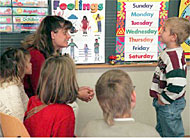Private schools face bumper year ahead

Private schools in Switzerland say they are being inundated with calls from parents who want to enrol their children for the next school year. The situation is at its most acute in canton Vaud, where the public education system is in the throes of major reform.
The number of pupils educated in private schools has been falling steadily. Ten years ago, almost six per cent of all children in obligatory schooling in the canton were in private schools. By last year, that figure had fallen to 2.5 per cent.
Yet anecdotal evidence suggests that a sudden wave of parents – some of them of limited means – are choosing to educate their offspring privately, even if it is only until secondary school, when the costs become much higher.
Francine Jeanprêtre, canton Vaud’s education minister, believes many parents choosing to send their children to private schools “have been taken in by the current demonisation of the public system”.
“An immense majority still have confidence in the public schools,” she says.
However, there has been a bitter debate in the local press about the overhaul currently taking place in the canton’s schools, known by its acronym, EVM.
The process has exposed an ongoing struggle between those who favour tests and the teaching of traditional subjects and those who prefer evaluation and a more holistic approach to produce more rounded individuals.
Many parents are opting for private schools because of their reputation for innovation. It was private schools that introduced bilingual education some years ago, as well as teaching languages from a very early age. A number of cantonal education authorities have now followed suit.
Many private schools introduce reading and writing much earlier than public schools, where children often do not begin until the age of six or seven.
“We have responded to the needs of the parents,” says Alain Boss, president of the Association of Private Schools in canton Vaud.
“The public system is too rigid, and especially in canton Vaud. It is an institution, and perhaps it finds it hard be innovative,” he told swissinfo. “But children have changed, parents have changed, business has changed. It cannot continue as it has.”
He also believes that private schools, which offer bilingual courses and internationally recognised examinations, are reflecting a growing pro-European mood among Swiss people, especially those in French-speaking areas.
Private schools are also attracting a number of families because they provide all-day timetables, meals, transport and supervised homework, which makes it far easier for mothers to work.
Francine Jeanprêtre points out that the canton has to provide a service not only for the more cosmopolitan families living in Lausanne and the commuter towns bordering Geneva, but also for Vaud’s sizeable rural communities. But she acknowledges that a more flexible approach is needed.
“Pressure from the business world, which needs a female workforce, will certainly help to move things along,” she says.
The cause of the private schools suffered a setback recently when voters in the Italian-speaking canton of Ticino voted to reject two initiatives which would have granted subsidies to parents who send their children to private schools.
It was estimated that, if it had been accepted, the system would have cost the canton SFr10 million ($6 million).
“The question was all wrong. The state would not have paid SFr10 million, it would have saved SFr10 million, because public education costs more than private education,” Boss says.
Despite the setback, he still believes that the issue of public subsidies for privately educated children will surface again: “I can see the same question being put to voters in Vaud within the next five years.”
For all the benefits of private education, it will only ever benefit a tiny minority of pupils. The many parents whose children, through sheer weight of numbers, cannot get into private schools, as well as those who would never consider educating their children outside the public sector, will inevitably put pressure on the cantonal authorities to change.
“We would welcome the competition,” Boss says.
by Roy Probert

In compliance with the JTI standards
More: SWI swissinfo.ch certified by the Journalism Trust Initiative
You can find an overview of ongoing debates with our journalists here . Please join us!
If you want to start a conversation about a topic raised in this article or want to report factual errors, email us at english@swissinfo.ch.